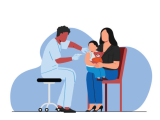Mar 6, 2003 (CIDRAP News) Seeking to remove a major barrier to its smallpox vaccination program, the Bush administration has proposed a program to compensate public health and healthcare workers who are harmed or lose wages because of the vaccine.
Modeled after a federal compensation program for police and firefighters, the plan would provide a death or permanent disability benefit of $262,100, according to the Department of Health and Human Services (HHS). It would also provide partial compensation for lost wages and cover medical expenses for significant reactions to the vaccine.
State smallpox response plans call for vaccinating a total of about 450,000 public health and hospital workers. As of Mar 4, about 5 weeks into the program, about 12,400 workers had been vaccinated, according to the HHS statement, issued yesterday. Healthcare workers' groups have cited the lack of a consistent nationwide compensation program as a reason many workers are reluctant to be vaccinated.
"We are asking these health professionals to perform a vital public duty, so we are proposing to provide them the same sort of benefits that we provide our public safety officers when they are injured on the job," Julie Gerberding, MD, director of the Centers for Disease Control and Prevention, stated in the HHS news release.
Any federal compensation program will require congressional action. The HHS statement said the department "will continue to work with Congress on addressing" a compensation package. Rep. Henry Waxman, D-Calif., introduced a compensation bill in the House in February, and two senators, Judd Gregg, R-N.H., and Edward Kennedy, D-Mass., are reported to be working on legislation as well.
Gregg was scheduled to appear at an HHS press conference about the proposal today, HHS spokesman Bill Pierce told CIDRAP news. He couldn't say, however, whether Gregg was planning to offer a bill reflecting the HHS proposal.
HHS said its plan is patterned after the Public Safety Officers Benefit (PSOB) program administered by the Justice Department. That program currently pays a $262,100 benefit for death or permanent and total disability. The proposed compensation plan includes four elements:
- Permanent disability benefit: $262,100 for permanent and total disability caused by the vaccine, to be paid regardless of any other benefits available to the person, except for first responders who are already covered by the PSOB program. About a third of first responders have that coverage.
- Death benefit: $262,100 for deaths caused by the vaccine. Like the disability benefit, this would be payable regardless of other benefits available to the survivors, other than those already covered by the PSOB plan.
- Temporary or partial disability benefit: HHS would pay people for two-thirds of lost wages after their fifth day out of work, up to a ceiling of $50,000. But this would be secondary to any workers' compensation or disability insurance benefit available.
- Healthcare benefit: HHS would reimburse workers for their "reasonable out-of-pocket medical expenses for other than minor injuries," to the extent that such expenses were not covered by health insurance.
HHS said the proposal also would provide compensation to people who contract the vaccinia virus secondarily from public health and healthcare workers who have been vaccinated.
It was not clear whether the compensation proposal includes the estimated 10 million additional healthcare workers and first responders who would be vaccinated in the second phase of the inoculation program. Pierce said more details were expected to emerge at today's press conference.
The compensation plan does not cover the public, "as it is not recommended that they receive the vaccine at this time," the HHS statement said.
In the statement, HHS Secretary Tommy Thompson said, "A smallpox release is possible and we therefore must prepare by offering vaccine to those most likely to respond. By preparing our emergency responders and giving them assistance with this compensation program, we are better able to protect the American people, which is our highest priority."
See also:
HHS news release
http://archive.hhs.gov/news/press/2003pres/20030305.html


















